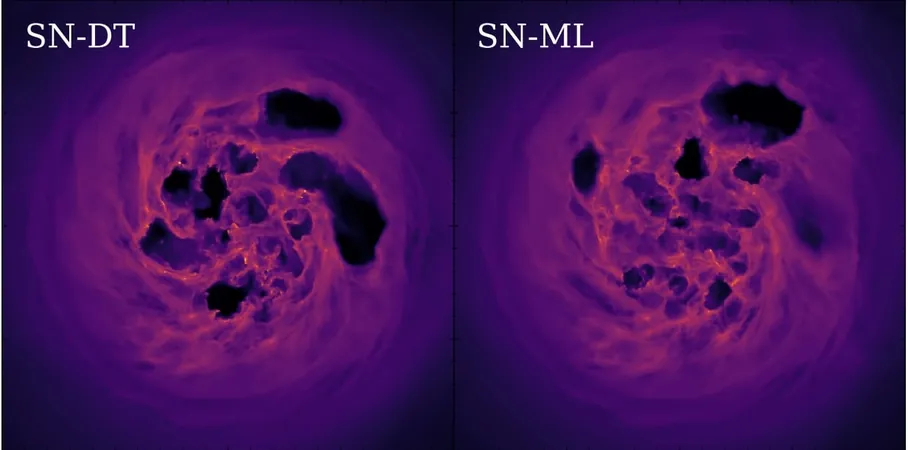
Groundbreaking Discovery Could Revolutionize Vaccine Storage: Say Goodbye to Refrigeration!
2025-01-17
Author: Ming
Introduction
In a remarkable breakthrough, researchers from Penn State University have unveiled a revolutionary storage technique that could eliminate the need for refrigeration for protein-based drugs and vaccines. This groundbreaking development has the potential to enhance the accessibility and affordability of hundreds of life-saving medications, including insulin and monoclonal antibodies, as well as viral vaccines.
The Research Methodology
Scott Medina, the lead researcher and an esteemed professor of Biomedical Engineering at Penn State, stated, “Over 80% of biologic drugs and 90% of vaccines require temperature-controlled conditions. This novel approach could revolutionize the storage and distribution of these vital products, saving billions currently spent on refrigeration throughout the supply chain. This innovation could bring protein therapies into environments where constant refrigeration is impractical, making them accessible to those who need them most.”
The researchers published their findings in the prestigious journal *Nature Communications*. Through a series of rigorous experiments, the team replaced the conventional water-based solutions used in protein medications with a perfluorocarbon oil. They tested this new solution across five different proteins, including antibodies and enzymes essential for health.
Promising Results
Promising results were observed during tests conducted on mice—demonstrating that the oil-based solution maintained the efficacy of the refrigerated versions without any toxic effects. This oil-based method also ensured that the protein samples remained sterile, as bacteria, fungi, and viruses thrive in water-based environments but cannot survive in the perfluorocarbon oil.
Challenges and Solutions
While proteins in water are easily soluble and can distribute evenly throughout the solution, the team discovered that the oil presented a challenge: proteins are less soluble in oil. To tackle this, they developed a surfactant, a special molecule that coats the proteins, allowing them to disperse evenly. The surfactant forms a protective shell around the proteins, keeping them stable and functional even at extreme temperatures, up to 212 degrees Fahrenheit—far higher than what would cause water to boil!
Quotes from the Lead Researcher
Medina explained, “Think of it like raincoats for proteins. Just as raincoats keep you dry, this protective layer guards proteins against heat and contamination.” He further elaborated that the stability of protein-based drugs is critical, given that they are sensitive to heat, light, and movement, which can degrade their structure over time.
Impact on Supply Chains
This innovative storage method could revolutionize supply chains by limiting or completely eliminating the complex logistics known as 'cold chain logistics,' which is vital for preserving the efficacy of temperature-sensitive medications. In fact, one study estimates that cold chain logistics may cost the global pharmaceutical industry a staggering $58 billion by 2026.
Risks and Benefits
Medina warned, “If something goes wrong in the distribution process, the efficacy of the protein therapy could be compromised, potentially harming patients.” By reducing costs and logistical challenges, this discovery could lead to better patient access to critical treatments.
Future Prospects
“There’s huge potential to use this method even in resource-scarce environments and on battlefields where refrigeration is scarce,” Medina noted, bringing to light the wide-ranging implications of this discovery.
Looking ahead, the research team aims to apply their technique to a broader range of proteins and collaborate with pharmaceutical companies to enhance the stability of various medications. Currently, they are pursuing patent rights to safeguard their invention and facilitate partnerships with the pharma industry for widespread implementation.
Conclusion
This discovery could mark a transformative moment in medical logistics, potentially reshaping the future of drug distribution by making life-saving therapies more accessible to populations in dire need. Stay tuned for further developments as the research progresses!




 Brasil (PT)
Brasil (PT)
 Canada (EN)
Canada (EN)
 Chile (ES)
Chile (ES)
 Česko (CS)
Česko (CS)
 대한민국 (KO)
대한민국 (KO)
 España (ES)
España (ES)
 France (FR)
France (FR)
 Hong Kong (EN)
Hong Kong (EN)
 Italia (IT)
Italia (IT)
 日本 (JA)
日本 (JA)
 Magyarország (HU)
Magyarország (HU)
 Norge (NO)
Norge (NO)
 Polska (PL)
Polska (PL)
 Schweiz (DE)
Schweiz (DE)
 Singapore (EN)
Singapore (EN)
 Sverige (SV)
Sverige (SV)
 Suomi (FI)
Suomi (FI)
 Türkiye (TR)
Türkiye (TR)
 الإمارات العربية المتحدة (AR)
الإمارات العربية المتحدة (AR)